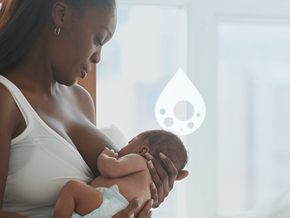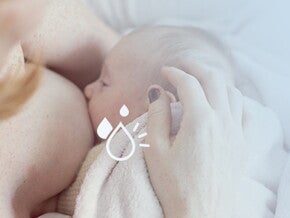
Benefits of Breastfeeding
Breastfeeding is nature’s intended way to feed a baby and has a number of health benefits for both mum and baby. In Australia, exclusive breastfeeding is recommended until around 6 months, and continued breastfeeding after the introduction of solid foods until 12 months – and beyond if mum and baby wish.
Breastfeeding should be every mum’s first choice to feed their baby and here are just some of the reasons why:
- Breast milk provides naturally developed, complete nutrition for the first 6 months of baby’s life. It contains all the key nutrients, in just the right amount for optimal growth and development.
- Fresh breast milk has not been heat treated, stored, dried, reconstituted, supplemented or manipulated.
- Breast milk does not require sterilisation and has anti-infective properties.
- Breast milk is served at exactly the right temperature and once established needs very little preparation.
- Breast milk changes and evolves as your baby changes and evolves, so it will always provide exactly what your baby needs in the right quantity and quality.
- It provides plenty of fluid your baby requires to stay hydrated.
- Breast milk is easy to digest.
- Breast milk contains omega 3 fats, such as DHA, which are important for optimal brain and eye development.
- Breastfeeding is more than just food. Breastfeeding soothes the baby with the smell and taste of their Mum; skin to skin contact enhances the emotional bond between mum and baby, and provides warmth, love and affection.
- Breast milk contains probiotics and prebiotics which support baby’s immune system – their natural defence system.
- Because food flavours pass through your milk, baby will experience some of the flavours of the foods you eat. These flavours teach your baby about what the family eats, even before they have a chance to taste them directly.
Research has shown breast milk should be the first choice for all
- Breastfeeding provides resistance to infections and is associated with less gastrointestinal and respiratory illness in first year of life.
- Breastfeeding is associated with reduced incidence and duration of diarrhoeal illness, protection against respiratory infection. There is some evidence breastfeeding protects against Sudden Infant Death Syndrome (SIDS).
- Breastfeeding has a possible protection against Necrotising Enterocolitis (NEC), enterocolitis, bacteraemia, meningitis, botulism and Urinary Tract Infection (UTI). Breastfeeding enhances brain development. Research shows there is better visual development and visual acuity in breastfed children.
Advantages for the mother:
- Breastfeeding stimulates special hormones which helps the uterus contract and return to pre-pregnancy size.
- Producing breast milk burns off lots of kilojoules which helps mum return to pre-pregnancy weight more quickly.
- Breastfeeding assists with bonding with your baby, snuggling, cuddling and skin to skin contact releases feel good hormones which helps you get through those tough moments.
- Breastfeeding gives you a time to relax and rest. Put your feet up and escape the hustle and bustle of the day.
- Breastfeeding delays the return of fertility, but you should never rely on this as a form of protection against becoming pregnant.
- Breastfeeding reduces the risk of several types of cancer such as premenopausal breast cancer and ovarian cancer, and osteoporosis.
- Breast milk is readily available and saves energy, time and money compared to bottle feeding. You only need your baby and your breast.
- Breastfeeding places you on the same sleep cycles as your baby, helping you to cope with the baby waking during the night – provided you sleep when your baby sleeps that is!


















